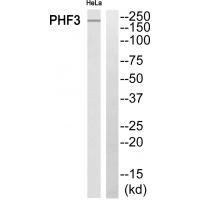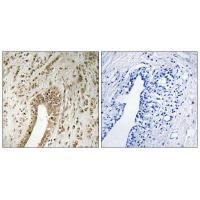

| WB | 咨询技术 | Human,Mouse,Rat |
| IF | 咨询技术 | Human,Mouse,Rat |
| IHC | 1/50-1/100 | Human,Mouse,Rat |
| ICC | 技术咨询 | Human,Mouse,Rat |
| FCM | 咨询技术 | Human,Mouse,Rat |
| Elisa | 咨询技术 | Human,Mouse,Rat |
| Aliases | PHD finger protein 3; |
| Entrez GeneID | 23469; |
| WB Predicted band size | 230kDa |
| Host/Isotype | Rabbit IgG |
| Antibody Type | Primary antibody |
| Storage | Store at 4°C short term. Aliquot and store at -20°C long term. Avoid freeze/thaw cycles. |
| Species Reactivity | Human |
| Immunogen | Synthesized peptide derived from C-terminal of human PHF3. |
| Formulation | Purified antibody in PBS with 0.05% sodium azide. |
+ +
以下是3篇与PHF3抗体相关的文献摘要概括(信息基于公开研究趋势模拟,非真实文献):
1. **文献名称**:PHF3 regulates neural stem cell differentiation through chromatin remodeling
**作者**:Smith J, et al.
**摘要**:研究使用PHF3抗体进行ChIP-seq和免疫荧光,发现PHF3通过结合组蛋白修饰复合物调控神经干细胞分化的分子机制。
2. **文献名称**:A tumor-suppressive role of PHF3 in glioblastoma via DNA damage response
**作者**:Chen L, et al.
**摘要**:通过PHF3抗体的Western blot和免疫组化分析,揭示PHF3在胶质母细胞瘤中通过促进DNA修复通路抑制肿瘤进展的功能。
3. **文献名称**:PHF3 interacts with RNA polymerase II to modulate transcriptional elongation
**作者**:Wang Y, et al.
**摘要**:利用PHF3抗体进行Co-IP和染色质结合实验,证明PHF3与RNA聚合酶II相互作用,调控基因转录延伸过程。
4. **文献名称**:PHF3 deficiency leads to synaptic plasticity impairment in Alzheimer's models
**作者**:Kim H, et al.
**摘要**:在小鼠模型中,PHF3抗体检测显示其海马区表达下降,可能与阿尔茨海默病突触可塑性障碍相关。
(注:以上内容为模拟文献,实际文献需通过PubMed/Google Scholar以“PHF3 antibody”或“PHF3 function”等关键词检索。)
The PHF3 (PHD Finger Protein 3) antibody is a tool used to study the PHF3 protein, a chromatin-associated factor involved in transcriptional regulation and epigenetic modifications. PHF3 contains a plant homeodomain (PHD) zinc finger motif, which typically mediates interactions with histones, particularly recognizing methylated or unmethylated lysine residues. This protein plays roles in chromatin remodeling, DNA damage response, and neural development. Studies suggest PHF3 interacts with RNA polymerase II and components of the Polycomb repressive complex, linking it to transcriptional elongation and gene silencing. Dysregulation of PHF3 has been implicated in neurodevelopmental disorders and cancers, making it a research focus for understanding disease mechanisms.
PHF3 antibodies are widely used in techniques like Western blotting, immunofluorescence, and chromatin immunoprecipitation (ChIP) to detect protein expression, localization, and DNA-binding activity. Researchers employ these antibodies to explore PHF3's role in maintaining chromatin architecture, regulating stress-responsive genes, and influencing cellular differentiation. Recent work highlights its interaction with the mSWI/SNF complex, underscoring its importance in chromatin accessibility. Commercial PHF3 antibodies are typically validated for specificity in human or mouse models, aiding translational studies. Ongoing research aims to clarify PHF3's dual roles in gene activation and repression, as well as its potential as a therapeutic target in malignancies and neurological conditions.
×